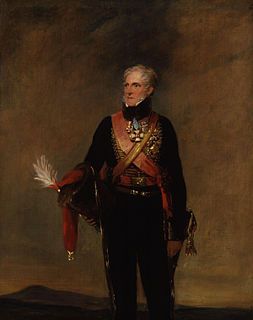 W
WHenry William Paget, 1st Marquess of Anglesey,, styled Lord Paget between 1784 and 1812 and known as the Earl of Uxbridge between 1812 and 1815, was a British Army officer and politician. After serving as a Member of Parliament for Carnarvon and then for Milborne Port, he took part in the Flanders Campaign and then commanded the cavalry for Sir John Moore's army in Spain during the Peninsular War; his cavalry showed distinct superiority over their French counterparts at the Battle of Sahagún and at the Battle of Benavente, where he defeated the elite chasseurs of the French Imperial Guard. During the Hundred Days he led the charge of the heavy cavalry against Comte d'Erlon's column at the Battle of Waterloo. At the end of the battle he lost part of one leg to a cannonball. In later life he served twice as Master-General of the Ordnance and twice as Lord Lieutenant of Ireland.
 W
WLieutenant-Colonel Augustus Henry Archibald Anson, VC was a member of the Anson family and a recipient of the Victoria Cross, the highest and most prestigious award for gallantry in the face of the enemy that can be awarded to British and Commonwealth forces. He served as member of parliament for Lichfield from 1859 until 1868, and for Bewdley from 1869 to 1874.
 W
WAlexander Cambridge, 1st Earl of Athlone, was a British Army commander and major-general who served as the fourth Governor-General of the Union of South Africa and as Governor General of Canada, the 16th since the Canadian Confederation.
 W
WWilliam George Hawtry Bankes VC was an English recipient of the Victoria Cross, the highest and most prestigious award for gallantry in the face of the enemy that can be awarded to British and Commonwealth forces.
 W
WMajor Henry Somerset, 7th Duke of Beaufort, KG, styled Earl of Glamorgan until 1803 and Marquess of Worcester between 1803 and 1835, was a British peer, soldier, and politician.
 W
WHenry Charles FitzRoy Somerset, 8th Duke of Beaufort KG, PC, DL, styled Earl of Glamorgan until 1835 and Marquess of Worcester from 1835 to 1853, was a British peer, soldier, and Conservative Party politician. He served as Master of the Horse between 1858 and 1859 and again between 1866 and 1868.
 W
WJohn Weston Brooke FRGS was a British military officer and explorer.
 W
WGeneral William Schaw Cathcart, 1st Earl Cathcart was a Scottish soldier and diplomatist.
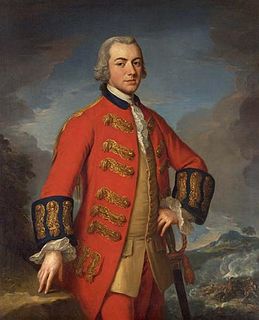 W
WGeneral Sir Henry Clinton, KB was a British army officer and politician who sat in the House of Commons between 1772 and 1795. He is best known for his service as a general during the American War of Independence. First arriving in Boston in May 1775, from 1778 to 1782 he was the British Commander-in-Chief in North America. In addition to his military service, due to the influence of his cousin Henry Pelham-Clinton, 2nd Duke of Newcastle, he was a Member of Parliament for many years. Late in life he was named Governor of Gibraltar, but died before assuming the post.
 W
WGeneral Sir William Henry Clinton was a British general during the French Revolutionary and Napoleonic Wars as well as the First Miguelist War. He was also the grandson of Admiral George Clinton and elder brother of Lieutenant General Sir Henry Clinton.
 W
WPrince Arthur of Connaught was a British military officer and a grandson of Queen Victoria. He served as Governor-General of the Union of South Africa from 20 November 1920 to 21 January 1924.
 W
WLieutenant-Colonel Edward Henry Cooper was an Irish officer in the British Army, a landlord in County Sligo, and a Conservative politician.
 W
WSir John Cope (1688–1760) was a British soldier, and Whig Member of Parliament, representing three separate constituencies between 1722 and 1741. He is chiefly remembered for his defeat at Prestonpans, the first significant battle of the Jacobite rising of 1745.
 W
WGeneral Sir David Dundas was a British Army officer who fought in the Seven Years' War and French Revolutionary Wars, wrote important texts on the Principles of Military Movements and then served as Commander-in-Chief of the Forces from 1809 to 1811.
 W
WLieutenant-General Sir William Erskine, 1st Baronet was a British Army commander and the 1st Baronet of the Erskine of Torrie creation.
 W
WLieutenant-General Sir Charles Craufurd Fraser was a British recipient of the Victoria Cross, the highest and most prestigious award for gallantry in the face of the enemy that can be awarded to British and Commonwealth forces. He was also a Conservative politician.
 W
WColonel James Gardiner was a Scottish soldier who fought in the British Army, including during the 1745 Jacobite rising, in which he was killed at the Battle of Prestonpans.
 W
WColonel Standish Darby O'Grady, 2nd Viscount Guillamore from Cahir Guillamore, County Limerick, was an Anglo-Irish politician and British Army officer.
 W
WField Marshal Douglas Haig, 1st Earl Haig, was a senior officer of the British Army. During the First World War, he commanded the British Expeditionary Force (BEF) on the Western Front from late 1915 until the end of the war. He was commander during the Battle of the Somme, the Battle of Arras, the Third Battle of Ypres (Passchendaele), the German Spring Offensive, and the final Hundred Days Offensive.
 W
WMajor Edward Hodge was a British Army officer killed in action the day before the 1815 Battle of Waterloo.
 W
WLieutenant-Colonel Hilary Hook was a soldier in armies of the British Empire in India and later in Africa.
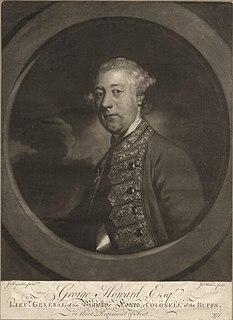 W
WField Marshal Sir George Howard KB, PC was a British military officer and politician. After commanding the 3rd Regiment of Foot at the Battle of Fontenoy in May 1745 during the War of the Austrian Succession and after commanding that regiment again at the Battle of Falkirk Muir and the Battle of Culloden during the Jacobite Rebellion, he returned to the continent and fought at the Battle of Lauffeld. He went on to command a brigade at the Battle of Warburg during the Seven Years' War. He subsequently became the Governor of Minorca.
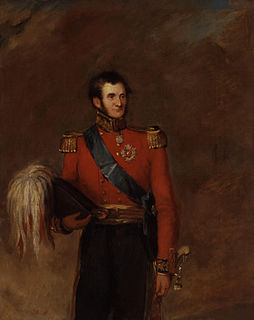 W
WGeneral Sir Edward Kerrison, 1st Baronet, was a British Army officer and politician.
 W
WJohn "Mad Jack" Mytton was a British eccentric and rake of the Regency period who was briefly a Tory Member of Parliament.
 W
WRobert Montagu Poore, CIE, DSO was a cricketer and British army officer who, whilst serving in South Africa in 1896, played in three Tests for the South African cricket team. Much of his cricket was played when he held the rank of Major, but he eventually became a Brigadier-General. "Of all the people in the history of the game," wrote Leo Cooper in an introduction to A. A. Thomson's Odd Men In, "he seems to stand for the Eccentric Ideal."
 W
WMajor General Aldred Frederick George Beresford Lumley, 10th Earl of Scarbrough, styled Viscount Lumley from 1868–84, was an Anglo-Irish peer, soldier and landowner. He was noted for his long service in both the Territorial Army and politics, which included 60 years in the House of Lords, and for his contributions to the growth of the seaside resort of Skegness, Lincolnshire.
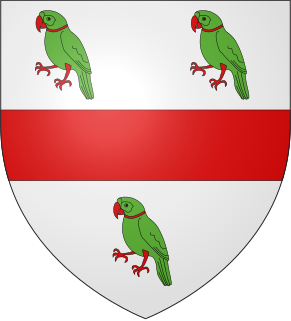 W
WLieutenant-Colonel Richard George Lumley, 9th Earl of Scarbrough was an Anglo-Irish peer and soldier.
 W
WField Marshal Sir John Wilfred Stanier, was a senior British Army officer who was Chief of the General Staff from 1982 to 1985. He was the first person after the Second World War to become the professional head of the British Army without having seen active service in that war or any subsequent campaign.
 W
WLieutenant General Richard Hussey Vivian, 1st Baron Vivian, known as Sir Hussey Vivian from 1815 to 1828 and Sir Hussey Vivian, Bt, from 1828 to 1841, was a British cavalry leader from the Vivian family.
 W
WColonel Thomas Wildman was a British Army officer during the Napoleonic Wars, a draftsman, and landowner.